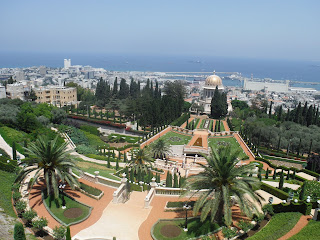I’ll start off with an apology. I
told myself that I was going to be better about chronicling the end of my
service and the associated emotional and logistical aspects of leaving Cameroon
and returning home. But as it turns out, there were better things to do with my
final few days at post (and even my first few months back home) than sit at my
computer writing about the only subject that I found myself talking and
thinking about: leaving. And besides, I had another online project that was
occupying a significant amount of my technology time (and internet bandwith):
my friend Anna and I started a blog
dedicated to the many potential uses for Laughing Cow cheese (La Vache Qui Rit)
in a primarily cheese-free culture. It turns out that the possibilities really
are close to endless.
 |
| Special shout-out to this crew. |
A few weeks
before I left Cameroon I had a conversation with my grandmother during which
she compared my impending departure from Cameroon to the departure from a
particularly meaningful summer camp. Convinced she was minimizing my
experience, I brushed her off without much of a thought. But as it turns out,
grandmothers know best. Climate aside, my time in Cameroon was nothing like
summer camp. But the process of coming back from a place that is so
wholeheartedly other- that one is
more familiar than I ever would have expected.
During one
of my first weeks back home my dad asked me what I missed about Cameroon, aside
from specific people. So caught up in the wonders of the developed world, my
answer: “nothing!” was a bit hasty. How could I miss a way of life where daily
inconveniences and struggles took up so much of my mental processes? Three
months later, I’ve had a bit of time to think about some of my favorite parts
of life in Cameroon and the aspects of life that I truly miss.
The first
two are easy. My first longing was for fresh tomatoes, no matter what time of
year. To expand this a bit further, the tropical fruit in Cameroon was second
to none. And while my market access was quite a bit better than most other
Volunteers, we all enjoyed some of the best avocadoes,
 |
| A highlight of my reunion tour cross-country trip. Davis, CA, is a truly wonderful place. |
While I will never say that Cameroon’s public
transportation system is superior to the one in America, it does have one major
advantage. Hitchhiking is common, safe, and often the best way to get around.
Volunteers often called it “taking a private car”, a rebranding that I found
hilarious. To put it briefly, you could get basically anywhere in the country
by standing on the correct side of the road, stopping any and all passing cars,
and explaining where you were trying to go. Sometimes they would take you
there, sometimes they would take you part of the way, and sometimes they would
drive past while deliberately avoiding eye contact. What fun! One time I found
myself in a car with a man who asked the driver to avoid stopping at any
checkpoints because he was travelling without an official ID card but with the
equivalent of $800,000 USD. The other passengers and I made the driver stop
immediately and we all got out. That day was less fun. Here in America,
hitchhiking is no longer considered socially acceptable or safe. There is
rising interest in ridesharing, but it lacks the spontaneity (or excitement) of
true hitchhiking. And don’t even get me started on the inefficiency of national
need for vehicular independence.
 |
| I missed this. |
This brings
me to my last point, which is a bit harder to explain. The main part of life in
Cameroon that I miss is the ‘assumed interdependence’ that permeates the
general way of doing things. Cameroon is far from being a Socialist country,
but it does have an unofficial community-based safety net that America seems to
lack. Friends and neighbors would routinely offer to help me carry my heavy
items, markets experiences were always infused with a touch of personality and
light-heartedness, and there is a collective understanding best summed up by
the expression “on est ensemble”-we
are together. America experiences this sentiment sometimes; we shine most often
at our very best and when faced with the very worst. But nearly every day in
Cameroon exemplified this idea: when my neighbors sent over a plate of dinner
because they knew it was my favorite dish, when someone would stop walking
wherever they were going to wish me a “Happy Sunday!”, when all meetings
started with a prayer for group members and their families. I am nearly as far
from being an expert on American culture as I am from being one about Cameroon.
But I would wager that many American would be better off if we approached our
fellow neighbors and citizens with a bit more of an interdependent mindset.
Because we really are together.
 |
| Four of us and this table have spent some time in Cameroon! |
I’ll close
off this blog with a sincere thank-you to my friends and family both here in
America and back in Cameroon. As much as I learned what I have to be grateful for
here in America-supermarkets, subways, and clean drinking water come quickly to
mind- it’s those of you that I have in my corner that I really needed. Thanks for
the letters, emails, phone calls, and those late night-Skype sessions when the Internet
was really strong. Thanks for coming to visit in rainy season when the road
down to my house was more of a mudslide, and thanks for coming in dry season when
the taps ran dry. Thanks for sharing two years of your lives with me and reminding
me that you just can’t hug every cat.





